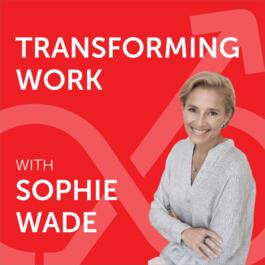
Sophie Wade - Reframing Change to Integrate, Design, and Upskill for AI at Work
Show host Sophie Wade welcomes 2025 focusing on the natural dynamic of modern work to facilitate executives’ and employees’ abilities to adapt. She outlines three priority areas for the year ahead, recommending how to adjust for and integrate AI as a core component of our tech-driven business and work. Highlighting research and examples, Sophie focuses on: human-AI collaboration, designing work for agility, and upskilling employees rapidly in the flow of work. Sophie emphasizes the principles of modern work: learning, intention, flexibility, and empathy, as well as systems thinking to help us recognize the full ramifications of our inventions and actions. TAKEAWAYS [00:42] Sophie sets the stage for 2025, focusing on adapting to rapid change. [01:29] Embracing change is essential. Rigid work structures conflict with human nature. [02:40] Work norms evolved based on prevailing possibilities and were not healthy or sustainable. [03:25] Flexibility and adaptability are natural and essential human traits. [03:58] Customization in work and products recognizes our individuality and different needs. [04:40] Human-centric approaches and tools foster creativity and problem-solving. [05:18] Early rigid work environments suppressed autonomy and innovation. [06:18] Modern work requires collaboration and proactive preparation for change. [07:20] Adapting to change thoughtfully can reveal the best evolutionary pathways. [08:44] Systems thinking helps anticipate and manage the ripple effects of innovation. [09:43] Modern work requires intentional action to navigate interconnected global systems. [11:10] AI integration is transforming the workforce into blended human-AI collaboration. [12:21] Leaders must identify opportunities for AI to complement humans and our skills. [14:05] Flattening hierarchies and skills-based work systems boost agility and engagement. [15:18] Internal talent marketplaces promote cross-functional use of employees’ skills. [16:37] Upskilling is critical for addressing skill gaps and maintaining competitiveness. [18:04] Continuous learning must be integrated into workflows for successful transformation. [18:35] Approaching change with intention, flexibility, and empathy reduces friction and boosts outcomes. [19:27] Empathy-centered leadership enables multigenerational and distributed teams to thrive. IMMEDIATE ACTION TIP: Incorporate learning, intention, flexibility, and empathy into workplace strategies. RESOURCES Sophie Wade on LinkedIn Sophie’s company Flexcel Network SophieWade.com QUOTES “We can lean into our natural capacity to adapt if we reframe what we’ve been used to and why.” “Work is in flux, nothing is set in stone, and adaptability is essential all along the way.” “Human-centric approaches and tools foster creativity and problem-solving because we are not machines and aren’t good at pretending to be.” “How you approach change, and specifically the significant ongoing changes occurring in and across our professional world, affects your ability to flex and adapt.” “Adapting to modern work requires continuous learning as a core habit, integrated into workflows and supported as part of daily operations.” “Empathy-centered leadership is critical, recognizing that each person has different skills, adapts at a different pace, and may encounter hiccups along the way.” “Internal talent mobility isn’t easy or obvious to operationalize, but it is necessary to keep pace with the faster evolution of modern work.” “Systems thinking recognizes that our actions are not independent or isolatable but always have ripple effects on others—and reciprocally on us.” “AI integration is enabling the emergence of a collaborative, blended human-AI workforce that complements uniquely human skills.”
From "Transforming Work with Sophie Wade"


Comments
Add comment Feedback